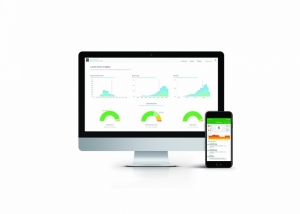Businesses struggle with data management
 |
| Losing competitive edge due to poor data management |
In the world of modern business, data is often regarded as the lifeblood of organisations. When harnessed effectively, data can substantially contribute to a company's rapid growth. However, even the slightest inaccuracies in data handling can cause significant harm.
Data fragmentation
As the leader of a team responsible for developing the HexaSync Integration Platform, Le Huu Hoang Gia, co-founder, and CTO of Beehexa, has observed that many companies are grappling with the challenge of managing data. He remarked that business data is scattered across multiple locations.
For example, mid-sized to large businesses, that are clients of Sapo Enterprise, not only utilise Sapo's solutions but also depend on various other data-containing systems, including ERP, CRM, CDP, accounting software, and internal work management tools. Despite the presence of similar features, these systems often exhibit variations in the way they handle data.
In 2022, MuleSoft, a platform akin to HexaSync and acquired by Salesforce in 2018 for $6.5 billion, was surveyed to investigate software usage patterns.
The survey revealed that, on average, medium-sized enterprises make use of approximately 976 software applications. However, only about 28 per cent of these applications are integrated, and the effectiveness of these connections remains unclear.
Nguyen My Linh, business development manager at Sapo Enterprise said, “We've come across companies dealing with extensive but dispersed data, requiring weeks to compile a coherent and actionable consolidated report.”
Linh believes that businesses frequently encounter challenges when it comes to ensuring accurate, timely, cost-effective, and secure data collection.
Besides data fragmentation, companies are grappling with inconsistent data arising from various application development platforms and incomplete or inconsistent user inputs, as pointed out by Ngo Xuan Bang, MIS director at SeedCom.
Bang emphasises that while security and data protection have always been important issues, they still present ongoing risks to organisations such as external attacks, software malfunctions, data errors, and human errors in data operations.
Numerous factors and barriers contribute to challenges related to data, including outdated API integration systems, inadequate human resources and procedures for data collection and analysis, as well as insufficient resources dedicated to ensuring information security and data protection.
Furthermore, the processes of data collection, processing, and analysis are fragmented and involve numerous intermediaries, leading to vulnerabilities. Many businesses have not fully recognised the significance of real-time data and reports in the context of digital transformation.
Data integrity
Utilising data correctly can drive a business towards rapid growth, as emphasised by Gia. However, even minor errors in data management can precipitate swift and serious consequences.
An illustrative example of data-related issues is the presence of discrepancies in product information across different systems. For instance, on an e-commerce platform, it may show that there is inventory in stock, when, in reality, the stock has been depleted. Such disparities, including pricing inconsistencies and inventory mismatches, can have a significant and detrimental impact, leading to substantial financial losses.
When product information data is improperly structured, it can hinder technology's ability to assist businesses in accurately assessing product trends and timing their business activities effectively.
Data-related challenges exert a substantial influence on business operations. When data and application systems crucial for business operations face issues, it results in the slowdown or even halting of production and business activities. Often, resolving these problems can incur significant time and financial costs, Bang said.
While business owners may possess a strong grasp of their company's operations and the significance of data consolidation and accuracy, they may not always be well-versed in effectively utilising software to guarantee seamless data flow across the system.
Generally, businesses often need to recruit personnel responsible for data input and export, data cleansing, and ensuring efficient data utilisation. However, business owners may have concerns about whether their employees truly comprehend the company's objectives and vision for the correct utilisation of software.
This is why Gia emphasises the importance of leveraging AI for data verification. Nonetheless, the majority of AI products in the current landscape tend to prioritise larger tasks, including product recommendations, customer demand prediction, customer segmentation, customer service automation, spam detection, and more advanced functionalities such as natural language processing and virtual assistants.
In contrast, while AI has made significant strides in handling larger tasks, fundamental processes such as data input, cleaning, and refinement remain predominantly at the algorithmic level, and there's a shortage of practical software applications in this specific domain.
"As businesses embark on digital transformation initiatives, they often find themselves walking a precarious tightrope, where any misstep can have significant consequences," said Gia.
Offering guidance to businesses, business development manager at Sapo Enterprise emphasises the critical importance of cultivating the right mindset concerning data and its role in business operations. This encompasses adopting a holistic perspective on data, examining it from various perspectives, exercising caution, and consistently referencing data, all while giving paramount attention to data security and information safety.
According to experts at Seedcom, businesses are advised to actively explore, and leverage technology platforms to establish efficient connections, and centralise, and standardise their data.
Utilising technology solutions with open-API connections is vital for building robust data collection, processing, analysis, and data connection processes.
When it comes to in-house application development, businesses need to prioritise standardisation and simplicity in their applications to prevent the unnecessary complexity of user experiences and data utilisation.
To safeguard data quality, businesses are advised to store their data in secure cloud platforms and implement stringent operating procedures and robust security measures to minimise the risks of incidents.
Moreover, business leaders need to foster the right mindset across their entire team. Businesses should focus on developing and strengthening the skills of their personnel in data extraction, data operation, and data analysis. Additionally, bringing in experienced professionals to support the analysis, appraisal, and standardisation of source data during the data warehouse construction process can be beneficial.
"Before making substantial investments in software, business leaders must ascertain the potential of their data to yield measurable value for AI learning. This understanding is crucial for enabling effective data exploration and utilisation while minimising the risk of even minor errors that could result in business losses or erroneous decisions," said Beehexa's CTO.
 | More efficiency via data management Leading international enterprise data management firm Orchestra Networks will host an event to share a glimpse with Vietnamese enterprises into what they can gain from optimising the wealth of data flowing through their fingers every day. Pierre Bonnet, co-founder of Orchestra Networks, shared with VIR’s Hai Yen how the company rose along with the need for data management across the globe. |
 | Data Management – the new challenge beyond Industry 4.0 Big Data and artificial intelligence, with their never-before-seen growth, are having a strong impact on society. Data has the potential to contribute to the development of humanity, but also poses unpredictable risks without proper governance. |
 | Schneider Electric grows lead in data centre infrastructure management Schneider Electric, a global leader in the digital transformation of energy management and automation, has just announced the continued roll-out of EcoStruxure IT Expert, its flagship cloud-based data centre infrastructure management solution. |
What the stars mean:
★ Poor ★ ★ Promising ★★★ Good ★★★★ Very good ★★★★★ Exceptional
Related Contents
Latest News
More News
- PM outlines new tasks for healthcare sector (February 25, 2026 | 16:00)
- Ho Chi Minh City launches plan for innovation and digital transformation (February 25, 2026 | 09:00)
- Vietnam sets ambitious dairy growth targets (February 24, 2026 | 18:00)
- Masan Consumer names new deputy CEO to drive foods and beverages growth (February 23, 2026 | 20:52)
- Myriad risks ahead, but ones Vietnam can confront (February 20, 2026 | 15:02)
- Vietnam making the leap into AI and semiconductors (February 20, 2026 | 09:37)
- Funding must be activated for semiconductor success (February 20, 2026 | 09:20)
- Resilience as new benchmark for smarter infrastructure (February 19, 2026 | 20:35)
- A golden time to shine within ASEAN (February 19, 2026 | 20:22)
- Vietnam’s pivotal year for advancing sustainability (February 19, 2026 | 08:44)

 Tag:
Tag:



















 Mobile Version
Mobile Version